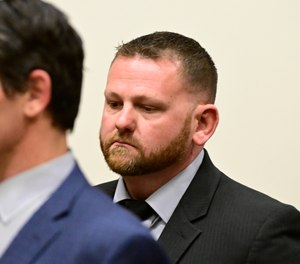By Colleen Slevin and Matthew Brown
Associated Press
BRIGHTON, Colo. — Jurors convicted a Denver-area police officer Thursday and acquitted another of charges in the 2019 death of Elijah McClain.
Aurora police officer Randy Roedema was found guilty of criminally negligent homicide and third-degree assault. The 12-person jury found officer Jason Rosenblatt not guilty on all charges. Roedema faces up to three years in prison on the more serious homicide charge, with sentencing to occur at a later date.

Aurora Police officer Randy Roedema, right, attends an arraignment at the Adams County Justice Center in Brighton, Colo., Friday, Jan. 20, 2023. (Andy Cross/The Denver Post via AP, File)
McClain died after being put in a neck hold by a third officer and pinned to the ground, then injected by paramedics with an overdose of ketamine.
Roedema and Rosenblatt were charged with manslaughter, criminally negligent homicide and second-degree assault — all felonies. However, the jury as it went into deliberation was asked to consider a lesser form of assault for Roedema, the one he was found guilty of.
The third Aurora officer and two paramedics were indicted on similar charges, but the paramedics have more counts.
[RELATED: Grand jury testimony: Ketamine, not police hold, caused Elijah McClain’s death]
Roedema and another officer who was not charged held down McClain while paramedics administered the ketamine. Rosenblatt’s attorney had pointed out during the trial that he was not near McClain at that point in the confrontation.
The three officers charged were the first on the scene and the ones who took McClain down the ground.
At least three other officers who were not charged were involved in restraining McClain at some point during the confrontation. One of them, officer Alicia Ward, testified for the prosecution that she had her hand on McClain’s head when the ketamine was administered but did not apply pressure. Ward said she would have applied pressure if McClain resisted at that point, but said she did not need to.
A local prosecutor in 2019 decided against criminal charges because the coroner’s office could not determine exactly how the 23-year-old massage therapist died. But Colorado Gov. Jared Polis ordered state Attorney General Phil Weiser’s office to take another look at the case in 2020, and the officers and paramedics were indicted in 2021 by a grand jury.
The killings of McClain, Floyd and others triggered a wave of legislation that put limits on the use of neck holds in more than two dozen states. Colorado now tells paramedics not to give ketamine to people suspected of having a controversial condition known as excited delirium, which has symptoms including increased strength.
Roedema and Rosenblatt did not testify in their defense at trial. Their attorneys blamed McClain’s death on the paramedics for injecting him with ketamine, which doctors said is what ultimately killed him.
However, prosecutors argued that the officers’ restraint of McClain contributed. Senior Assistant Attorney General Jason Slothouber told jurors that Roedema and Rosenblatt also encouraged the paramedics to give McClain ketamine by describing him as having symptoms of excited delirium that they had learned about in training. But he said the officers did not tell them anything about McClain’s complaints that he could not breathe, something prosecutors said happened six times.
McClain was stopped Aug. 24, 2019, while walking home from a convenience store on a summer night, listening to music and wearing a mask that covered most of his face. A 911 caller reported him as suspicious, and the police stop quickly became physical after McClain, seemingly caught off guard, asked to be left alone. He had not been accused of committing any crime.
The encounter quickly escalated, with Officers Nathan Woodyard, Roedema and Rosenblatt taking McClain to the ground, and Woodyard putting him in a neck hold and pressing against his carotid artery, temporarily rendering him unconscious. The officers told investigators they took McClain down after hearing Roedema say, “He grabbed your gun dude.” He later said Rosenblatt’s gun was the target.
The initial statement was heard on the body camera footage but exactly what happened is difficult to see. The prosecution urged jurors to be skeptical, saying Rosenblatt said he could not feel anyone reaching for his gun.
But one of Roedema’s defense lawyers, Don Sisson, pointed out that McClain said “I intend to take my power back,” which he argued showed intent. The officers had to act in the moment to protect themselves, according to Sisson.
“They didn’t get to watch the video over and over and over for three weeks before they get to act,” he said.
Paramedics injected McClain with ketamine as Roedema and another officer who was not charged held him on the ground. He went into cardiac arrest en route to the hospital and pronounced dead three days later.
The doctor who performed McClain’s autopsy, Stephen Cina, has said he died of complications from the ketamine while also noting that occurred after the forcible restraint. However, Cina was not able to say if the death was a homicide or an accident or if the officers’ actions contributed to McClain’s death.
Dr. Roger Mitchell, another forensic pathologist who reviewed the autopsy and body camera video, found their actions did play a role. He labeled the death a homicide.


